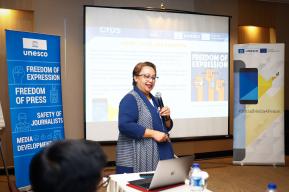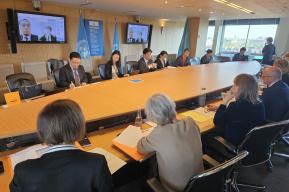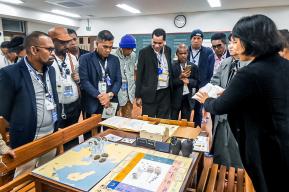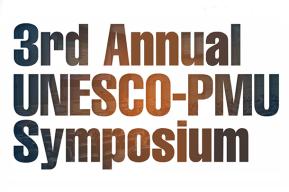News
Ethical Connections of the Third Sector project completes training of CSOs for effective and transparent management
UNESCO in Brazil and Petrobras worked together, once again, on an innovative and fundamental project aimed at training Brazilian civil society organizations (CSOs). The Ethical Connections of the Third Sector project, which involved more than 1,000 managers who work with children, adolescents, and young people and benefited 147 CSOs, represents the success of this partnership that was able to produce impacts in the process of strengthening these organizations, which shared their experiences and knowledge and committed themselves to improving their practices.
The results of Ethical Connections of the Third Sector were presented on 2/10, in Rio de Janeiro, with the participation of the Director and Representative of UNESCO in Brazil, Marlova Jovchelovitch Noleto, José Maria Rangel, Executive Manager of Social Responsibility and other representatives from Petrobras, project organizers and facilitators and representatives of CSOs.
Our partnership with Petrobras is part of a larger and broader partnership. Always looking at how we can contribute to empowering organizations and increasingly helping to strengthen public policies, making them effective as State policies and not only government
UNESCO in Brazil and Petrobras, aware of the importance of the third sector, joined together in this project, which began in 2018, to strengthen the management of partner CSOs, offering training to support the performance of their functions, with ethics and transparency. The project was designed to contribute to the promotion, development, and strengthening of capabilities of the immense network of CSOs that work in the social and environmental areas of Brazil to build a better and fairer country for all.
With an emphasis on content on ethics, integrity, and transparency, the project was designed to offer tools that aim to strengthen the management of CSOs, qualifying them to enhance the results and positive impacts of their work, with careful observance of integrity practices, known as compliance.
In addition to this monitoring stage during the execution of projects, this educational part is very important, of working together, disseminating this information, building these ethics and compliance mechanisms by institutions, helping with this issue of management structuring. We have institutions that are more robust in this regard, but that looked at this training and saw opportunities for improvement, and others that had not yet started their journey, and this process helped a lot
The project created teaching material in partnership with the JS Brasil team to offer the various actors that make up the CSO network grounded and specially prepared training. Participants in these trainings also received specialized technical support so that they were able to disseminate the culture of integrity in their daily relationships and contribute to the country's advancement in fundamental aspects for renewing trust and increasing the credibility of institutions.
"Petrobras' partnership with UNESCO is fundamental because it qualifies and gives a very broad notion of what it is like to take care of socio-environmental projects in our company", said the executive manager of Social Responsibility at Petrobras, José Maria Rangel.
The project is part of the effort to achieve the Sustainable Development Goals (SDGs) of the United Nations 2030 Agenda and is in line with UNESCO's institutional mission of contributing to the development of the agenda of equal opportunities, and social inclusion, as well as promoting greater transparency and accountability in the use of resources.
The president of JS Brasil, Miguel Fontes, assessed that it was possible to work on a “sum concept” in this project. “A concept that could bring a trajectory of reflection on the importance of strengthening management systems within a CSO, because we are all subject to risks. So, it is not a question of provoking, but rather of bringing attributes to the CSOs within a reflection of the CSO itself, without direct interference, so that these concepts could be brought. And we were very well received.”







